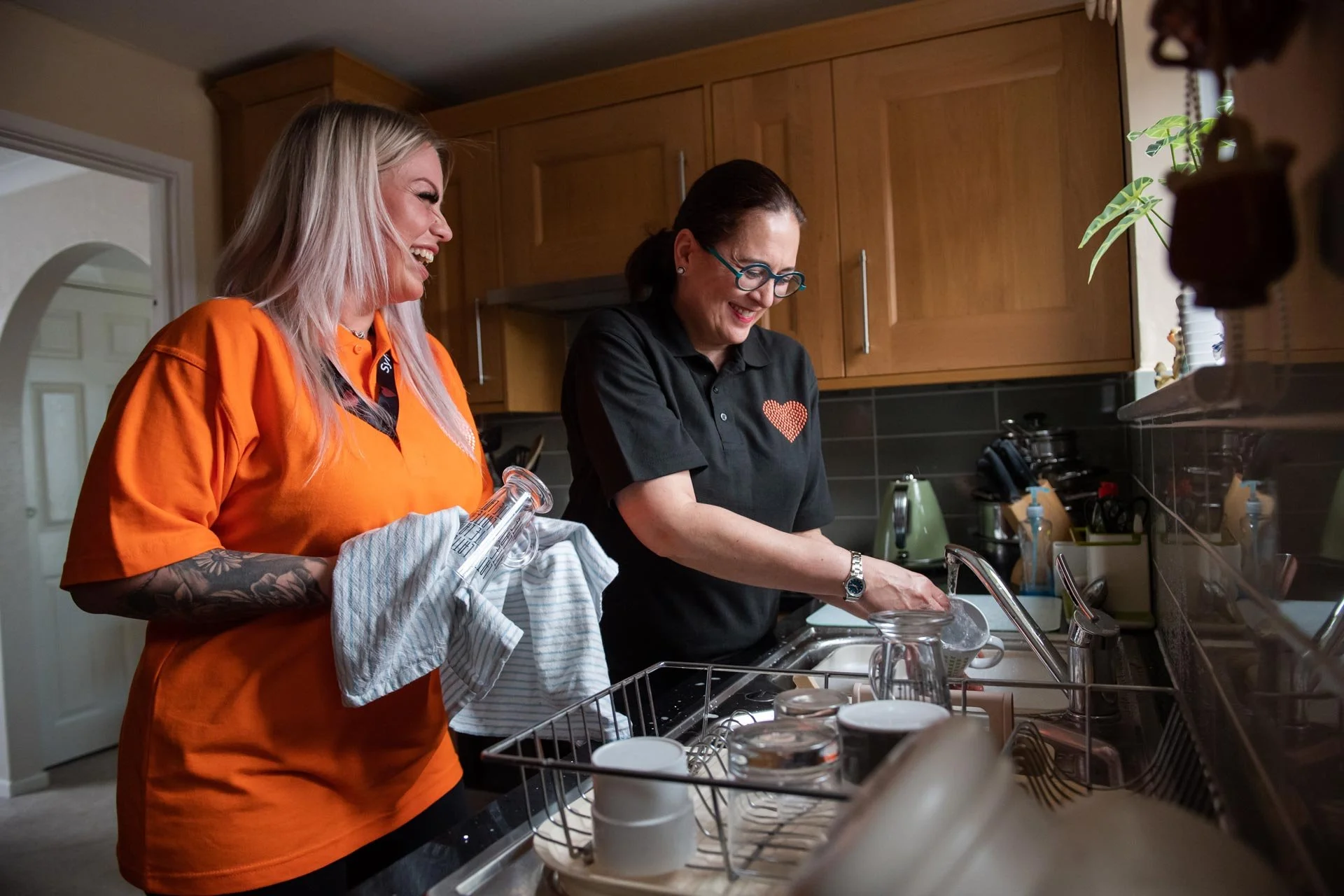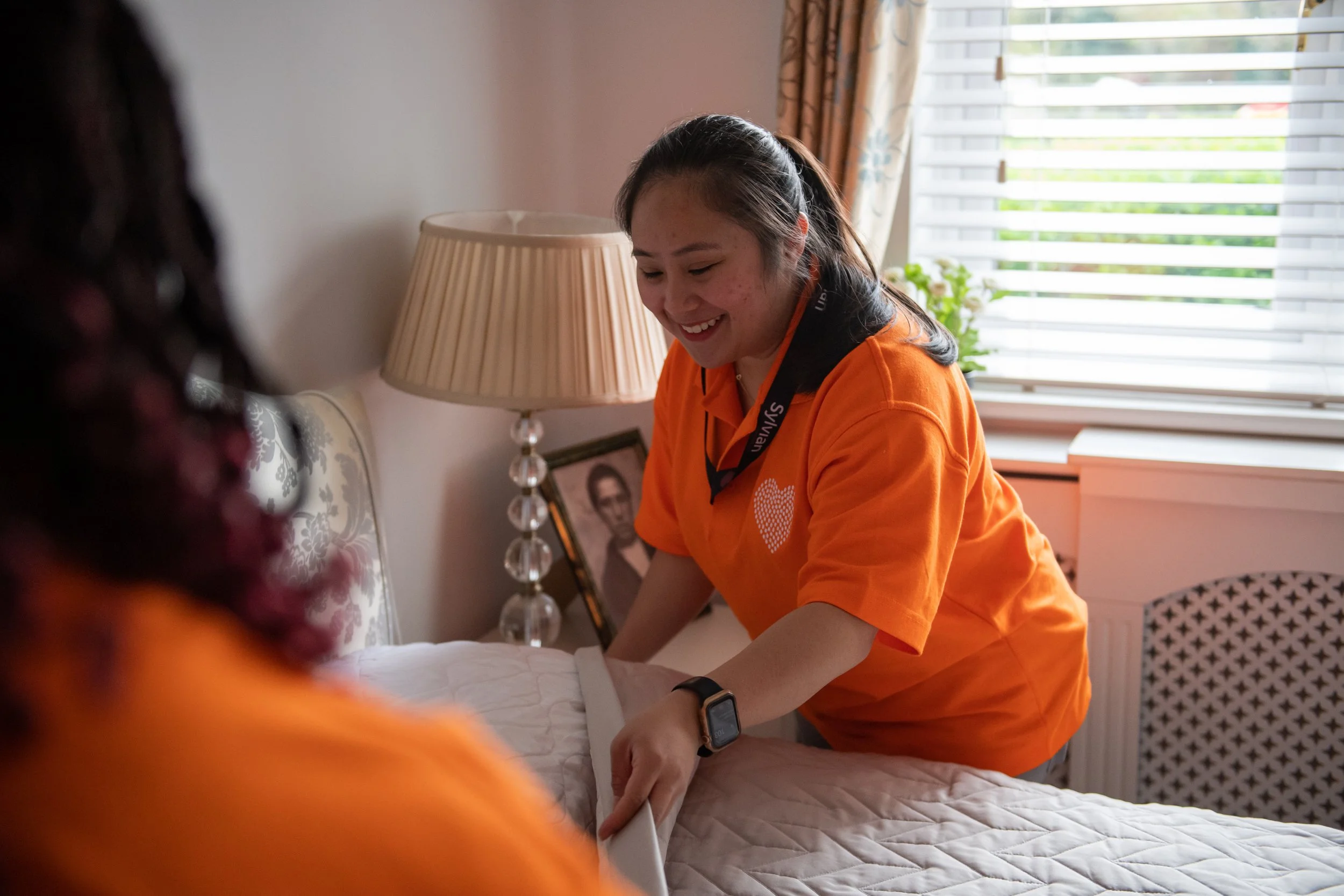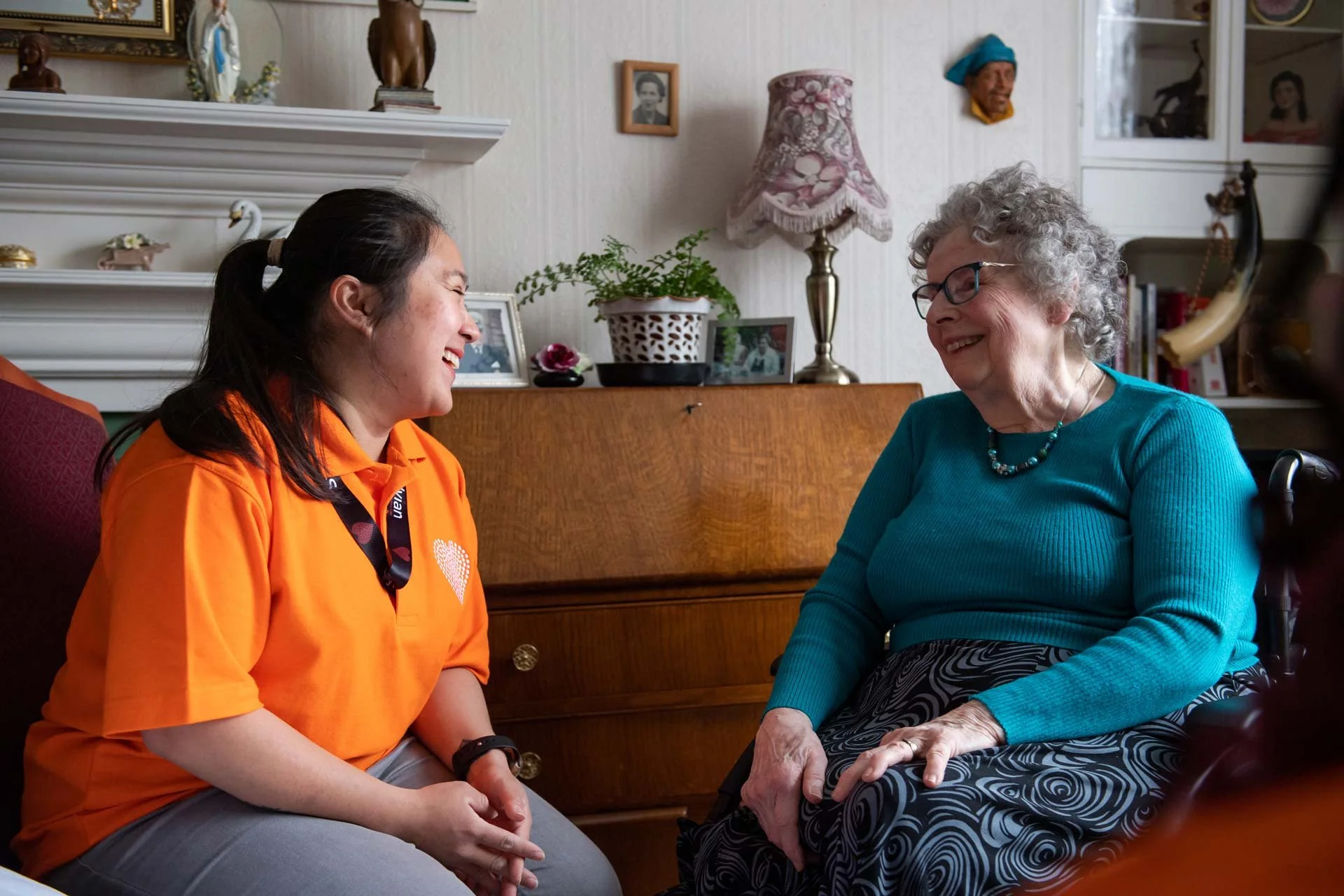Home Care
Hourly Care Visits From a Trained Healthcare Assistant
When an individual finds it difficult to carry out personal care routines, such as washing or dressing, home care can provide the support they need to stay safe and independent in their own home.
Whilst this sector of care is all classed under the same heading, our service is always tailored to meet the individual needs of each of our clients. The support that we offer under Home Care covers different aspects, such as practical home help, personal care, help with daily tasks and medication administration.

How Can Home Care Help?
Professional carers can visit you at home to help with a wide range of tasks, including:
getting out of bed in the morning
washing, dressing and maintaining personal appearance
help with toileting and using continence aids
preparing meals and drinks, and help with eating and drinking
picking up prescriptions and helping to manage your medication
health-related tasks, as agreed with a medical professional
helping with shopping, paying bills or collecting pensions
getting out of the house and meeting friends
supervision and companionship
getting settled for the evening and going to bed.
Home care is also a safe and affordable alternative to residential care and helps individuals stay at home for longer. This type of care can make a huge difference, not only to your life, but also to your close friends and family, especially if they are caring for you.
1. Personal Care Assistance
Domiciliary care workers help clients with personal hygiene tasks such as bathing, grooming, dressing, and toileting. This assistance respects the dignity and comfort of the client, ensuring they can maintain their personal standards in a familiar environment.
2. Meal Preparation
Nutrition is vital for health, and many seniors or individuals with disabilities may struggle with cooking. Care workers can assist with meal planning, grocery shopping, and meal preparation, ensuring that clients receive nutritious and well-balanced meals tailored to their dietary needs.
3. Light Housekeeping
Keeping a home clean and tidy can be a challenge for caregivers or those with limited mobility. Domiciliary care includes light housekeeping tasks such as dusting, vacuuming, washing dishes, and laundry. By handling these chores, care workers
Domiciliary Care
Domiciliary care is another name for home care provided in the comfort of a person's own home. It plays a crucial role in maintaining the quality of life for individuals who may have difficulty performing daily activities independently. This type of care emphasises person-centred support that respects the individuality and preferences of each client.
Help with Domestic Tasks: Key Features of Domiciliary Care
Domiciliary care, also known as home care, is designed to provide support and assistance for individuals who require help with daily living tasks while remaining in the comfort of their own home. One significant aspect of domiciliary care is the assistance with domestic tasks, which is crucial for maintaining a safe and healthy living environment. Below are key features of the support provided in this area:
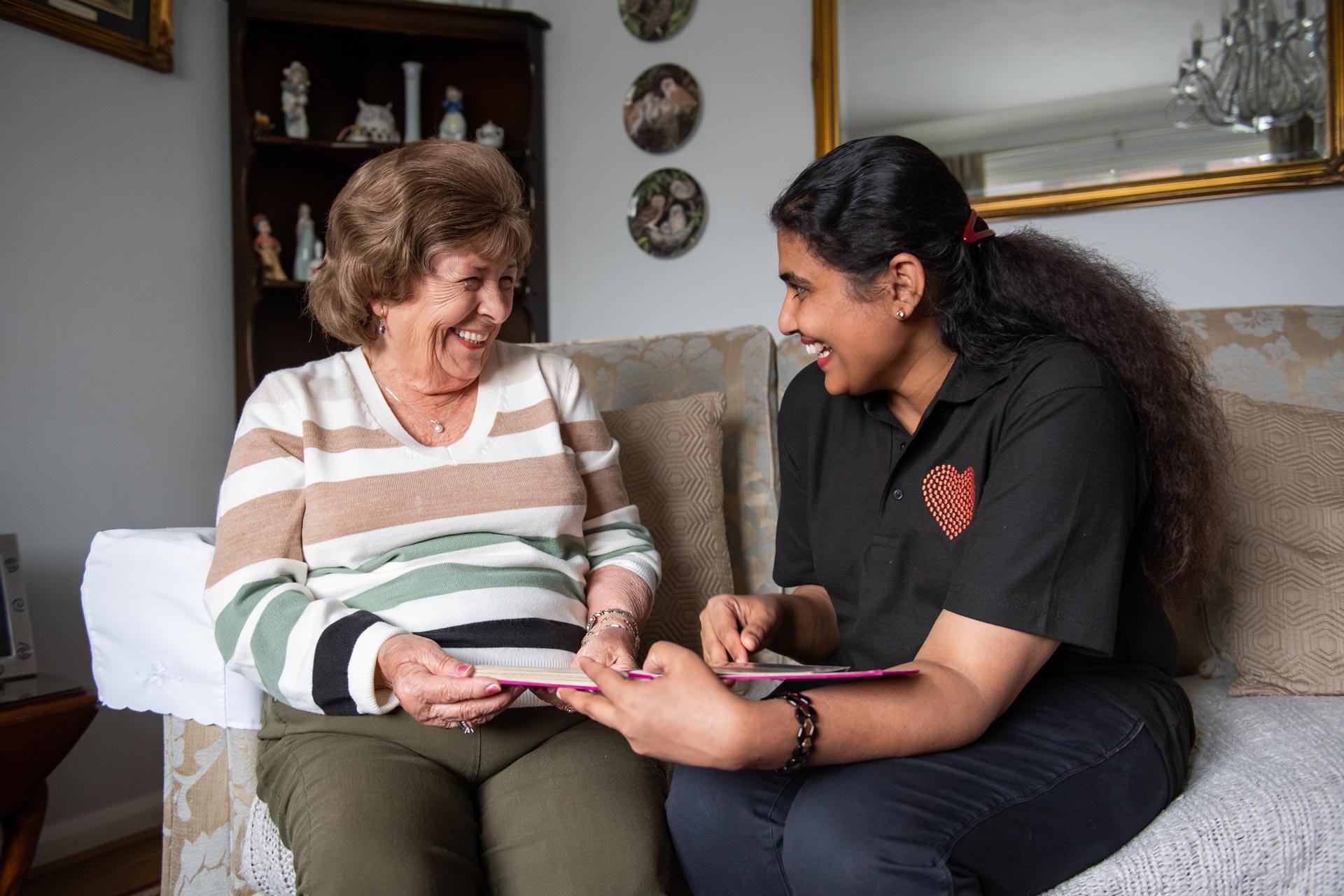
Arrange Home Care
If you would like to arrange home care for yourself or a loved one, please don't hesitate to get in touch with us. Speak with one of our dedicated team to Select your local office and speak to one of our dedicated team and arrange an appointment to where we will present you with a bespoke care plan.
Frequently Asked Questions
-
When providing Personal Care, all of our care staff remain conscious of the sensitive nature of this service. Our personal care will help with the more intimate or personal daily routines which our clients may find have become more difficult or even impossible to manage without assistance.
Personal Care is support that involves physical contact between carer and client so it can include: assistance in getting out of bed in the morning; help with washing and dressing; assistance with maintaining personal appearance; help and support with toileting/incontinence; getting settled in for the evening and going to bed.
We realise the difficulties that some clients face in accepting this level of care and all of our care staff are trained to respect the dignity of those that they care for, ensuring that we take a considered and respectful approach to an individual’s personal home care routines.
Our care givers pride themselves on being discreet and professional. They will respect how their clients like to maintain their personal routines and will support them to whatever level is necessary, from full support to waiting outside the bathroom or bedroom in case they are needed.
Nail cutting. We understand that nail and toenail cutting is a task that many of our clients need help with, however due to the nature of the task we are not insured to provide this service to our clients. There are many nail and toenail cutting services available and these usually involve you purchasing your own nail cutting kit. The service is provided by a specially trained professional. Our staff would be happy to refer you to a nail cutting service in your area.
-
Many of our clients continue to live independent and active lives but on occasion simply need a ‘bit of help'. The Sylvian team are there to provide that practical help and support. It may be a need for assistance with housework such as cleaning, doing the laundry or the preparation and serving of meals. It could involve shopping, where our care staff will either accompany clients on a shopping outing or if they prefer, shop on their behalf.
All of our carers recognise that they are not simply in someone's home to ‘do jobs'. They are also there to provide friendship and companionship.
We recognise that supporting our client's to have a life outside of the home is an important factor in their continued wellbeing. Planning and arranging trips out to visit family or friends or providing support in order to allow clients to participate in social activities such as, coffee mornings, social clubs, and bingo or the theatre or cinema are all part of the service that we offer. When an invitation to a wedding, birthday party or christening arrives our clients can be confident that they can attend, as we are happy to provide any support needed for the duration of the event.
Irrespective of what level of support is required we will, wherever possible, and where it is safe to do so, let our clients do things for themselves. We encourage independence and the confidence that it brings. Our home care team will always respect those we support, offering a personalised service, and taking into account an individual's personal lifestyle, culture, choices, and wishes.
Many of our clients continue to live independent and active lives but on occasion simply need a ‘bit of help'. The Sylvian team are there to provide that practical help and support. It may be a need for assistance with housework such as cleaning, doing the laundry or the preparation and serving of meals. It could involve shopping, where our care staff will either accompany clients on a shopping outing or if they prefer, shop on their behalf.
All of our carers recognise that they are not simply in someone's home to ‘do jobs'. They are also there to provide friendship and companionship.
We recognise that supporting our client's to have a life outside of the home is an important factor in their continued wellbeing. Planning and arranging trips out to visit family or friends or providing support in order to allow clients to participate in social activities such as, coffee mornings, social clubs, and bingo or the theatre or cinema are all part of the service that we offer. When an invitation to a wedding, birthday party or christening arrives our clients can be confident that they can attend, as we are happy to provide any support needed for the duration of the event.
Irrespective of what level of support is required we will, wherever possible, and where it is safe to do so, let our clients do things for themselves. We encourage independence and the confidence that it brings. Our home care team will always respect those we support, offering a personalised care plan, and taking into account an individual's personal lifestyle, culture, choices, and wishes.
-
People who need care and support often require support with their medication. As a home care provider, we have a responsibility to ensure the proper and safe use of medicines, and that staff responsible for the management and administration of medication are suitably trained and competent.
The carers would make a record each time they provide medicine support. The record will include who administered the medicine and whether a medicine was taken or declined. The carers would only administer medicines according to the medication label and they cannot take verbal instructions on how to administer medication.
Medicines support is any support that enables a person to manage their medicines. In practical terms, this covers:
prompting or reminding people to take their medicines
helping people remove medicines from packaging
administering some or all of a person’s medicines
No records will be made if the person is managing their medicines themselves.
-
Making alterations to your home: Making adaptations to your home may be necessary in order to enable you stay living independently for longer. These can range from installing stairlifts and using electronic wheelchairs to choosing smaller items that will ease the comfort of day-to-day living, such as gadgets for preparing food and drink safely, as well as simple alterations to make the bedroom or bathroom safe and comfortable.
If you find using stairlifts are not safe for you or not possible to install one, moving your bedroom downstairs, might be a solution.
Occupational therapists (OT) are best suited to advise on the type of adjustments you may need to make to your living environment as well as the transfer equipment you may need. You can request an OT assessment through your GP or through your Local Authority – if your care package is funded by the council. Alternatively, we can make an OT referral on your behalf with your consent.
Our care team is trained in the most advanced Moving and Positioning techniques and we are making sure that their training is refreshed annually. By following our Health and Safety procedures this ensures not only that you have a safe and comfortable experience when transferring from bed to your armchair for example, but also that our carers can continue working without feeling the cumulative effect of heavy lifting affecting them
-
The elderly and people suffering from disabilities often need special measures to manage the risks associated with living alone.
Telecare and personal alarms can operate 24/7 and provide extra security and peace of mind between carers’ visits. These can come in a variety of wearable forms from bracelets to pendant alarms which people can press when they need to summon help when they suffered a fall, feel unwell or need some re-assurance or when emergency services are not able to help. There are many Telecare services available and they normally require a yearly or monthly subscription.
-
To help you decide whether home care is right for you, consider the main pros and cons.
Advantages of home care
Home comforts: allows older people to stay in their own homes for longer.
Peace of mind: for you and your family that you’re being looked after and aren’t alone.
Time: it may prevent, or delay, a move into a care home.
Stability: you can maintain contact with friends and your local community.
Flexibility: care can be tailored to your needs. You can have as little, or as much, help as needed – from a few hours a week to 24-hour live-in care. Home care services can also be used temporarily.
Agency responsibility: when care is provided by a care agency such as Sylviancare is, we are responsible for vetting our staff and we will cover absences if necessary. All care agencies must be registered with national regulators who check that they are working to set standards.
Cost: care at home can be cheaper than moving into a care home, depending on the amount of care needed.
Pets: if you have pets, they can continue to live with you.
Disadvantages of home care
Carers aren’t around 24/7: unless you have a live-in carer. If you need the reassurance of having a carer living with you, please read our section on live-in care. You could also consider a personal alarm system or other telecare devices.
Different staff: although we pride with the consistency of our carers, sometimes different staff may be used in times of staff sickness, holiday or when there is a shortage of carers. Carers might not always call at the arranged times (for example, if they have to deal with an emergency at their previous call), which can be difficult if the older person needs to be helped to the toilet.

How To Find The Right Care For You Or Your Relative
1. Find your local office here
2. Get in touch with us
3. Carry out an assessment
4. Care team chosen and care starts
Nationwide Locations
Arrange Care With Our Expert Advisors
Sylvian Carers go above and beyond each day to fulfil the needs of our clients by providing a high standard of care that is completely personalised and compassionate. Explore how we can assist in arranging care for yourself or a loved one by locating your nearest office and reaching out to us today.
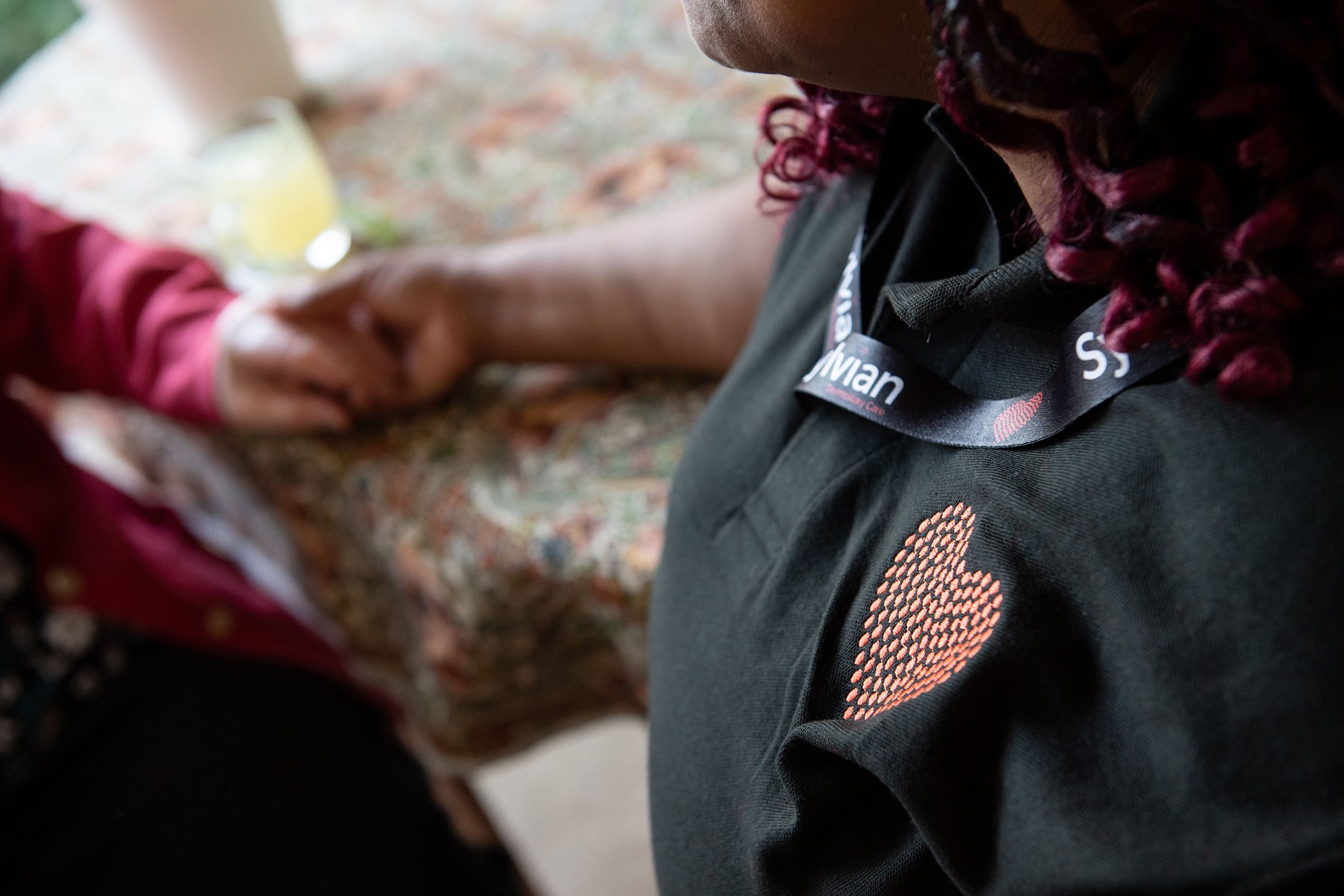
Explore our Other Services
At Sylvian Care, our friendly team has a commitment to enhancing the quality of life for our clients goes beyond just home care. We offer a comprehensive suite of excellent care services tailored to meet the diverse needs of individuals and families.
All of our services offer an invaluable resource that caters to the diverse needs of individuals requiring assistance, whether due to age, illness, or disability. The changes that our services have had on the lives of our clients are significant, including enhanced emotional well-being, improved safety, and the flexibility to tailor care plans that best suit individual needs and promote a higher quality of life.
All of our home care services meets the standards of the Care Quality Commission.

